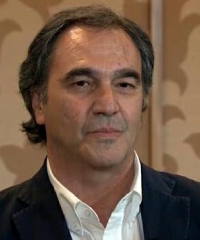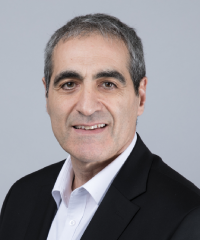ICIN 2023 Keynotes
Keynote #1
Title: Artificial Intelligence and the Digital Twin: How to exploit a closer integration
Abstract: This talk addresses the possibilities and the synergies of adopting Artificial Intelligence technologies in conjunction with the usage of Digital Twins. A high-level description of the applicable AI technologies to the context of DT is provided in relation to the type of functionalities needed by a DT. The properties of a DT are then analyzed and related to major AI techniques that can help in designing and implementing the DT. An example of a simple DT enriched by AI is then provided and discussed in order to map the technologies to actual cases. The last part offers general guidelines and choices to be considered respectively during the design phase of a Digital Twin and the Operational one. Some considerations on the impact of the DT approach and how to make it effective are also discussed.

Roberto Minerva
(Telecom SudParis, France)
Bio: Roberto Minerva, associate professor at Telecom SudParis, Institut Polytechnique de Paris, holds a Ph.D in Computer Science and Telecommunications, and a Master Degree in Computer Science. He currently conducts research in the area of Edge Computing, Digital Twin, Internet of Things and Artificial Intelligence applications. During 2014-16, he was the Chairman of the IEEE IoT Initiative. Roberto has been for several years in TIMLab as research manager for Advanced Software Architectures. He is author of several papers published in international journals, conferences, and books.
Keynote #2
Title: Slices: European Scientific Large-Scale Infrastructure for Computing/Communication Experimental Studies
Abstract: Various countries and regions have already announced formal plans of government support for their research and development efforts that will define 6G.
In order to research and master digital infrastructures, the scientific community needs to address significant challenges regarding their efficiency, trust, availability, reliability, range, end-to-end latency, security and privacy. Building and deploying test platforms is complex as digital infrastructures develop rapidly, are powered by technology and driven by applications. It is therefore critical to anticipate the demand and challenging to build the next generation of test platforms.
A generation of test facilities has emerged lately in all continents with initiatives such as NSF/PAWR and FABRIC, Colosseum, CENI and ICT-17 projects. Similarly, the software-driven approach to design and deploy digital infrastructures has triggered significant open-source initiatives such as ONAP, OAI, OMEC and O-RAN that can also inspire the framework of test platforms.
The enabling technologies such as separation between the network and the compute, virtualization, distribution and Cloud SaaS offer us the opportunity to define physical and digital platforms for at-scale research and experimentation. This trend is going to impact the telecommunication and computer-based sectors, from design to products to operation and this is where the testbeds meet the network as a fully controllable, programmable virtualized test platform. The science of Digital Infrastructures raises multiple complex challenges to the research community that already started to explore them in the context of the forthcoming 6G. Experimentation is becoming an even more important methodology to assess and qualify the diverse design assumptions and choices in realistic conditions. It is now timely not only to strengthen existing facilities ready for 5G testing but also most importantly to start developing early 6G platforms as most components are software-based. This is the motivation for proposing a holistic approach where all resources (compute, storage, network) are mobilized to address the end-to-end scenario, integrating all technologies and components. This approach will allow to continuously design, operate and automate the full life cycle management of applications and services. Such platform will be based on a technology roadmap that will be consolidated on the basis of the analysis of several inputs provided by the community regarding the wireless technology advances, that are pertinent to the evolution of new radio (NR) and core network (CN) unti-2030.
On the methodology side, our community still lacks a rigorous approach to the results produced and exposed as encyclopedic knowledge. Reproducibility is addressed regularly with almost zero progress. A scientific article is considered as reproducible if the authors provide all the data and computer codes necessary to repeat the same analysis and to obtain the “same” results (depending on the deterministic characteristics of the environment under test). Reproducibility should be provided on the same but also on different platforms. As a consequence, test platforms can also play a critical role in supporting the full research life-cycle, open data and reproducibility. The presentation will introduce the SLICES initiative and the main methodology and solutions just started being deployed and will discuss the various challenges and concerns regarding the design and usage of these platforms.

Serge Fdida
(Sorbonne Université, France)
Bio: Serge Fdida is a Professor with Sorbonne Université since 1995. His research interests are related to the future internet technology and architecture. He has been leading many research projects in Europe, notably pioneering the activity on federated Internet testbeds. He established PlanetLab Europe in 2007 and the OneLab and FIT facilities. He was one of the founders of the ACM Conext conference, general chair of ACM Mobicom 2015 and IEEE Infocom 2019. Serge Fdida has also developed a strong experience related to innovation and industry transfer, – he was the co-founder of the Qosmos and Hopcast companies, – one of the active contributor to the creation of the Cap Digital cluster in Paris and President of EIT Health France. He is currently coordinating SLICES, the first large-scale scientific instrument in Digital Sciences, supported by the EU ESFRI framework
Serge Fdida received his PhD from Université Pierre & Marie Curie (UPMC), Paris in 1984. He received his Habilitation in 1989. Assistant professor UPMC (1983-1987). Associate professor UPMC (1988-1991). Professor Université Paris Descartes (1991-1995). Sabbatical at IBM Raleigh in 1995. Professor Sorbonne Université. Adviser ITC Department CNRS (2000-2005). Vice-President European affairs of UPMC (2014-2018). VP International Development of Sorbonne Université (2018-2021).
Keynote #3
Title: Artificial Intelligence for Network Automation – Standards Enablers and Research Directions
Abstract: It is undeniable that techniques, methodologies and tools stemming from the field of artificial intelligence has already started to play a key role in the evolution of networking technologies and is foreseen to play an even more important role in shaping how future networks, distributed systems are not only operated but also designed and deployed. This talk will look into the challenges of integrating AI techniques in and for networking and in particular will describe requirements and the development of network automation standards enablers to support this integration in end-to-end, multi-vendor infrastructures.

Laurent Ciavaglia
(Nokia, France)
Bio: Laurent Ciavaglia is leading the network management, intelligence and data research and standards team at Nokia, and contributes to network automation technologies in various standards working groups and research communities.
Prior, Laurent has worked with Rakuten Mobile and Rakuten Symphony as Head of Autonomous Networks Innovation Europe.
He has extensive experience in inventing future network automation technologies with focus on intent-driven, zero-touch and artificial intelligence techniques. *
Laurent is an experienced standards contributor as editor and co-author of multiple specifications in the IETF, IRTF and ETSI in the fields of telemetry, zero-touch networking, intent-based networking, autonomic networking, closed-loop operation and coordination, and integration of machine learning and machine reasoning functionalities in networking environments.
Laurent serves as co-chair of the IRTF Network Management Research Group (NRMG) and participates in standardization activities related to network and service automation in IETF, O-RAN, ETSI, ITU-T and TMF.
Laurent is also a proud member of the IEEE network operations and management community (CNOM).











